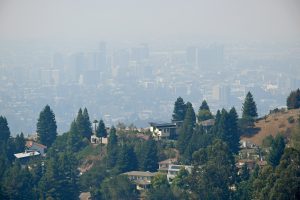
Breathing wildfire smoke: A scientist mom’s concerns
This post originally appeared on EDF Voices.
Maria Harris is an Environmental Epidemi
If the risks, hardships and anxiety of life during a pandemic were not enough, my fellow northern Californians are now facing another health crisis.
As I write this, hundreds of wildfires are burning across the state, among them two of the largest ever in California. Together, the fires have burned more than 1.4 million acres, destroyed 2,800 homes and buildings, killed eight people and forced thousands to evacuate their homes.
On top of the acute risks to lives and homes, residents across the state are suffering from highly polluted air as massive plumes of smoke fill the skies above our homes.
Children, seniors and those with lung disease are especially vulnerable
As a mom of two young kids, it’s been a tough couple weeks of anxiously monitoring air quality data and maps to determine if and when it might be safe to go outside, while seeking information on how to keep my family healthy.
As an environmental health scientist, I know that wildfire smoke has been linked to a range of negative health impacts, including asthma exacerbation, which can lead to emergency room visits and hospitalizations, along with increased rates of heart attacks and even death. Children and pregnant women, as well as those with heart disease or respiratory conditions like asthma, are particularly vulnerable to the health impacts of wildfire smoke.
Climate change and wildfires are connected
We all know it’s hard to think about the long term when you’re in the middle of a crisis. But as a parent, my concern about this year’s fires is compounded by my fear of what climate change will mean for the health of my kids and children around the world.
Here in the Western U.S., climate change is lengthening the wildfire season and increasing the frequency, severity, and size of fires. It’s critical that we harness our collective fear and frustration over what has become a distressingly predictable annual occurrence to take the actions on climate change that will help us avoid a future where wildfires become even more devastating.
Clean energy could reduce air pollution-related deaths by 40% in US
At EDF, most of my work focuses on air quality and how it impacts our health. New research recently presented to Congress finds that air pollution currently causes more than 200,000 early deaths each year in the United States. Taking action to transition away from fossil fuels and meet the targets scientists say are necessary to avoid the most catastrophic impacts of climate change could cut deaths due to air pollution by 40% and save 1.4 million lives over the next 20 years.
These changes could also yield huge economic benefits – more than $700 billion a year due to improved labor productivity and health alone. By addressing the threat that fossil fuels pose to our climate and investing in alternatives to cleanly fuel our economy, we’ll also dramatically cut pollution emissions that cause enormous harm to public health.
California will get through this wildfire season, even if we’re bruised at the end of it. We’ve proven that our residents, businesses and entire economy are incredibly resilient. But once the fires are extinguished, let’s continue to be clear-eyed about the connections between wildfires, warmer and drier summers, air pollution and the changing climate. And let’s focus our resolve on holding our leaders to account and demanding actions and solutions that will protect our children’s health and future.










